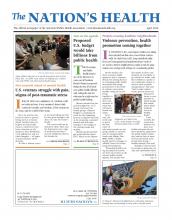In a global landscape peppered with wars, assault, terrorism, motor vehicle accidents, domestic abuse and natural and human-made disasters, post-traumatic stress disorder is a growing public health concern, affecting more than 5 million U.S. adults each year.
Post-traumatic stress disorder, or PTSD, can occur after being exposed to a traumatic event, and its link to adverse health outcomes is the topic of a new APHA book. “Post-Traumatic Stress Disorder and Chronic Health Conditions” spotlights the relationship between PTSD and health conditions such as chronic pain, obesity, diabetes, metabolic syndrome and substance abuse, and looks at the multiple pathways by which traumatic events can lead to PTSD and other health outcomes.
“PTSD is a common and often serious disorder,” said Steven S. Coughlin, PhD, the book’s editor. “Some people are exposed to a traumatic experience and don’t develop PTSD, but those who do can develop chronic PTSD, so it’s an area of active research.”
PTSD goes away in about 50 percent of sufferers, but others experience chronic PTSD, and the condition is relatively frequent among veterans and military personnel, according to Coughlin, a senior epidemiologist in post-deployment health at the Department of Veterans Affairs and an adjunct professor of epidemiology at Rollins School of Public Health.
The book examines PTSD in relation to numerous triggers, including natural disasters such as hurricanes and earthquakes, motor vehicle accidents, severe injuries, physical and sexual assault, and terrorist attacks. But a major focus of the book is PTSD among veteran populations and returning military personnel.
“The prevalence or frequency of PTSD in veterans of Operation Iraqi Freedom and Operation Enduring Freedom is relatively high,” said Coughlin, noting that veterans of previous eras, including the Vietnam War, also continue to suffer. “We have a lot of veterans coming back from Afghanistan and Iraq and there are great efforts to assist them.”

According to the book, chronic pain is frequently reported by veterans and is often associated with significant levels of psychological distress and physical disability.
The book also looks at the history and epidemiology of PTSD as it relates to a range of chronic conditions, including obesity, diabetes and cardiovascular disease, as well as psychological or psychiatric conditions such as major depression, alcoholism and bipolar disorder. The relationship between PTSD and traumatic brain injury is also addressed.
In addition, several chapters look at important health topics related to the effects of PTSD on women, who report higher rates of PTSD and chronic pain and are more likely to be exposed to interpersonal violence. According to federal statistics, about 10 percent of women and 5 percent of men will be affected by PTSD at some point in their lives.
Coughlin said the book is intended for a broad audience, including health professionals, researchers and graduate students.
Despite the growing body of literature on PTSD and chronic health conditions, many important questions remain to be answered, Coughlin said, noting that additional research is needed about resilience factors that may protect some people from developing PTSD.
To buy “Post-Traumatic Stress Disorder and Chronic Health Conditions,” visit www.aphabookstore.org. For more information, email apha{at}pbd.com.
- Copyright The Nation’s Health, American Public Health Association









